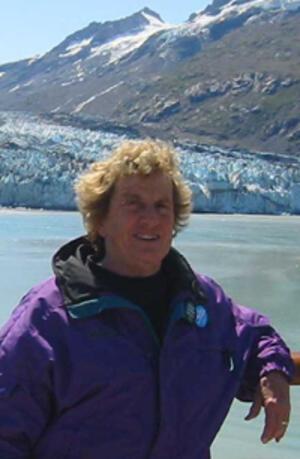Joan Feynman
Astrophysicist Joan Feynman shaped our understanding of solar winds, auroras, and sunspots, and her battle to open scientific bastions to women transformed the field for those who followed. Although discouraged by her mother from pursuing science, Feynman was mentored by her brother, Nobel-winning physicist Richard Feynman, who regularly included her in his childhood experiments. Joan Feynman earned her doctorate in physics from Syracuse in 1958. She successfully lobbied the American Geophysical Union to stop meeting at venues that barred women and African-Americans, and pushed for women to present papers and chair sessions at national science conferences. While raising children, she moved from one research station to another, including the National Center for Atmospheric Research in Boulder, the National Science Foundation in Washington, and Boston College before taking a post at the Jet Propulsion Laboratory in Pasadena from 1985 until her retirement in 2003. An expert on solar radiation, Feynman created models to predict sun spot cycles and the amount of radiation that spacecraft will absorb over time (leading to better shielding), and discovered links between solar activity and climate change. NASA honored her with their Exceptional Achievement Medal in 2002. Joan Feynman passed away in 2020 at age 93.
Joan Feynman's grandparents immigrated from Poland to New York in the late 19th century, where they worked as hatmakers and watchmakers. Feynman grew up with Reform Judaism in Far Rockaway, New York, where her fascination with science began early on. Her brother, Richard Feynman, taught her in the crib, and she assisted in his makeshift lab for two cents a week. A transformative moment for Joan occurred on her fourteenth birthday when she discovered her name in a textbook left by her brother, and she realized that women could indeed be scientists, inspiring her future endeavors in the field. Feynman was in high school during the Holocaust, which deeply affected her and inspired her religion in college. She attended Oberlin College, where she helped create its first Jewish student congregation. Originally, she wanted to be a physicist’s assistant, but her brother encouraged her to become a great physicist herself. Some of her professors treated her well, but others discriminated against her. She got married right after graduation to Richard Hirshberg. They both worked at the Naval Research Labs. Despite her better grades, Feynman’s coworkers did not always respect her and often gave her non-physics jobs like flirting with repairmen. Feynman and Hirshberg attended Syracuse University for graduate school, then moved to Guatemala for a year for Hirshberg’s anthropology Ph.D. Back in America, Feynman received her Ph.D. in physics and gave birth to three children in quick succession. She wanted to be there for her children, even though her career might suffer. So, she saw a psychiatrist, hired help, and took a number of part-time lab jobs. Feynman sometimes had to hide her gender to be taken seriously, publishing under “J. Hirshberg.” She found her niche in solar-terrestrial relations, such as studying aurora and solar wind. At the same time, she forged paths for tackling women’s discrimination in the American Geophysical Union. By 1985, Feynman needed a change, so she moved across the country to work at the Jet Propulsion Lab for NASA, where her work helped ensure safety in space travel, while also studying climate and agriculture. While the science world is not perfect, she’s heartened by the amount of progress for women since she began her career. Ultimately, she stresses the importance of hard work, doing work that you love, and having role models for young women.



